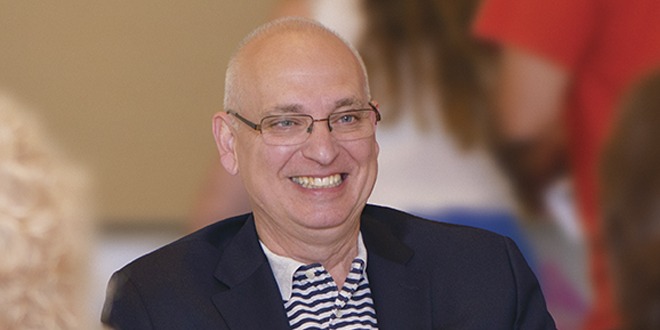People with type 2 diabetes write back to their younger selves, to share personal insights and reflect on their experience of living with diabetes and starting on insulin therapy. In this post, Richard reflects on living with diabetes.
Richard learnt at an early age that he had to rely on himself to get anywhere in life. After moving from Spain to the USA at age 12, without knowing any English, he became a newspaper delivery boy for the apartment building where he lived. Realising the efficiency of delivering papers in a concentrated area, compared with riding a bike from house to house, he bought out the paper routes of three other carriers for apartment buildings in the area. Before long, he was earning $300 a week in tips and was able to pay for his trips back to Spain every summer.
“The only way forward was to make my own way. It’s what drove me, but at the same time it was a detriment to be so self-absorbed,” Richard says. “I didn’t see that we do need other people. One cannot face and battle diabetes alone. It’s necessary to have a collective approach because nothing is achieved in this life without the help of other people.”
Though he had some set-backs, including an early marriage that failed, Richard remarried and had a son when he was 32 years old. All was well until the toddler stopped talking at age 2. The little boy was diagnosed with autism spectrum disorder, about which not much was known at the time. Soon after, his wife, Tina, quit her job so that she could help their son. She told Richard that he needed to step up to the plate financially.
“Then I started doing whatever I could do to make money. I started, honestly, just running away from it,” remembers Richard. “I focused on making the money we needed to pay for the services that my son required. So, I became this very strong type A personality, someone who believes ‘I can do anything; I can do all of this.’”
He launched himself into selling dental and medical equipment and spent most of his time travelling all over the world, wining and dining customers. He thought he was unassailable, until one day, when he was 46, his body felt utterly miserable. He couldn’t catch his breath and felt an overwhelming sense of anxiety and dread.
He promptly went to his doctor. He weighed 118 kilograms and his blood sugar was 26.5 mmol/L. The doctor sent him to an endocrinologist who told Richard that he had type 2 diabetes. The globe-trotting executive was stunned. He walked outside towards his car, but sank down on some steps before he got there. It was pouring with rain. Richard sat in his suit, getting soaked. It was the first time in his life that he truly felt scared.
Richard, now 56 is writing to himself at this moment, 10 years ago.
Dear ‘Narcissist’
Your entire life you have always thought you were invincible. If you could see it coming, you could beat it. But you never thought the threat would come from within your body. Even though you’ve been eating and drinking your way around the world, gaining weight and buying bigger clothes, you’ve been thinking of yourself as healthy, untouchable. Problems like diabetes don’t happen to successful people, do they?
Yes, they do. Richard, it is happening to you. You are caught up in a persona you created out of necessity for your family. You’ve created a mythology about who you are: completely self-sufficient, succeeding where others have failed through sheer determination. Professionally, success after success has conditioned you to expect – and accept – nothing less than complete success in all aspects of your life.
Your conquering-hero guise has served you well. As the sole breadwinner, you are the person that is funding treatment for your son’s autism spectrum disorder. But when something threatens this identity you fear the whole edifice will come tumbling down.
You have just been diagnosed with type 2 diabetes, so right now, you’ve been shaken to your core. If you can’t defeat this enemy within you, maybe you are not the person you thought you were. It’s shocking to think you can’t make it go away with the sheer determination that you have brought to bear on so many challenges.
Listen, facing this situation is very important. Realise that your actions today, such as dieting and adhering to your prescribed treatment, will be reflected in your body tomorrow. You will be able to lose weight and stop taking the pills that the doctor has prescribed. But eventually you will go back on the pills and eventually add insulin to your treatment plan. This will help you control your blood sugar.
But it won’t be until you also give up the intensely stressful role you’ve lived for so long – and realise how much you want to have a better connection to other people – that you’ll be able to keep your diabetes under good control.
Keep the faith in yourself and focus on the positive in your life.
Narcissist no more,
Richard
This story has been edited by Ellyn Spragins and shared with support from Novo Nordisk Canada. The views and opinions expressed are not representative of Novo Nordisk, and should not be considered treatment advice. Novo Nordisk has permission to share this letter and included personal details.
 Diabetes Care Community Learn, connect and care
Diabetes Care Community Learn, connect and care




